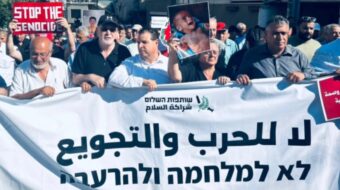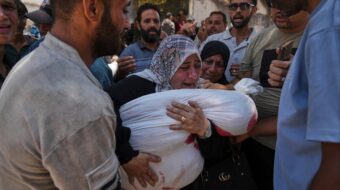The reality of war has the phones ringing. As the death toll of U.S. forces since the start of the war rose to 900 this week, and the Bush administration’s rationale for war lies shredded by the truth, military personnel have been contacting a loosely-knit network of dozens of conscientious objectors (CO) groups, known as the GI Rights Hotline, to find a way off the front lines.
“We get thousands of calls per month,” soft-spoken hotline volunteer Bill Galvin told the World. “The sharp spike began about two weeks before the invasion of Iraq and has only increased. We have had to bring on new counselors to meet the volume,” he said.
“Mostly, callers are soldiers who have been part of or witnessed something repulsive in either Afghanistan or Iraq. Most have served their tour and received orders to return. Many say that they would rather go to jail than go back to Iraq,” he said.
Military personnel in their late teens and early 20s, first-term enlistees, are the largest group calling the hotline. But career GIs and officers also call. “In 2003, we had a cadet from West Point” call, Galvin said.
In the early ’70s Galvin was a CO during the Vietnam War and never looked back. His 30 years of experience honestly and successfully counseling military personnel on their rights, including CO status, brings a ring of balance and confidence.
The estimated 200,000 young people who join a branch of the military each year are less about flag waving and more about food, rent and college tuition. This volunteer army has been called the “poverty draft.”
Recent stories of two working-class women, one African American and one white, offer a glimpse of economic reality. Shoshana Johnson from Midland, Texas, and Jessica Lynch, from Palestine, W.Va., were part of a March 23, 2003, ambush in Iraq which took the life of Lori Piestewa, the first Native American Indian woman killed in military service to the United States. Johnson and Lynch joined the Army looking for a future, for a job.
“Young people join today for money for college or their community offers no opportunities,” Galvin said.
Canada is not the alternative it was during the Vietnam era, Galvin emphasized. “If you get caught with ‘illegal’ status, you are handed over directly to U.S. officials,” he said. Currently, two soldiers are seeking asylum in Canada.
In Boston, Charlie Richardson, of Military Families Speak Out, demands that loved ones be taken out of harm’s way – now. Richardson, whose son is a Marine, although not currently stationed in Iraq, was not surprised by the U.S. Senate report, released July 9, which said Bush’s justification for war was a lie.
“We were saying that all along,” he the World by phone.
And to those who say, “We created this mess, we have to clean it up,” Richardson replies: “Occupation is the problem, not the solution. Military occupation does not stabilize Iraq nor strengthen the country. We need to get our troops out and send in resources to rebuild. We will keep speaking out until it’s over. Really over.”
Galvin and Richardson know war up close and personal. It is not an applause line, nor cheap rhetoric. To these men, it is real.
To contact the GI Rights Hotline call (800) 394-9544.
The author can be reached at dwinebr696@aol.com.









